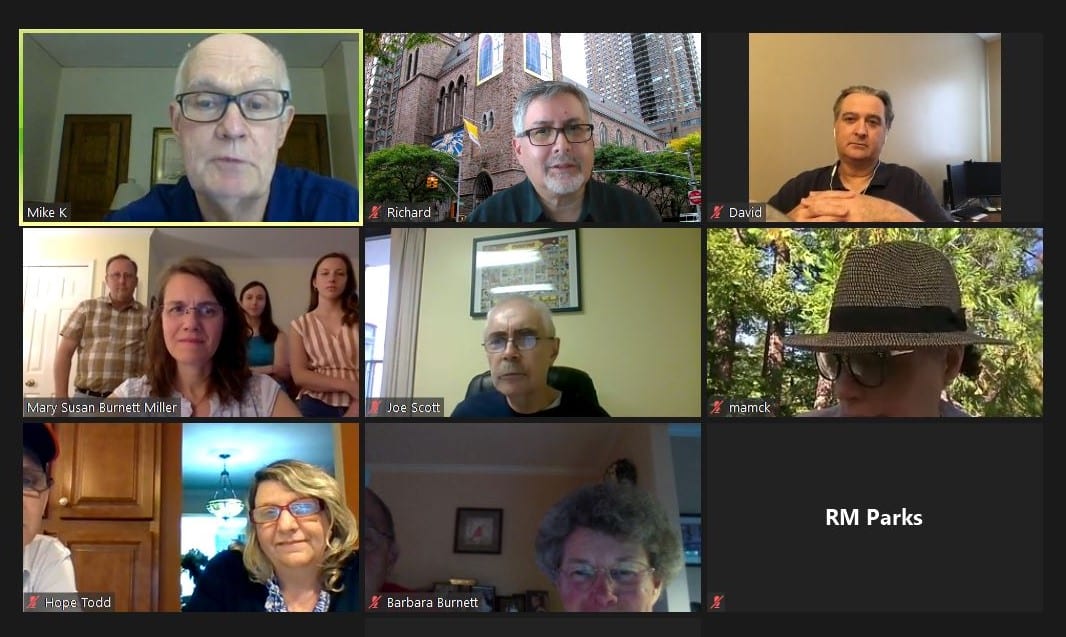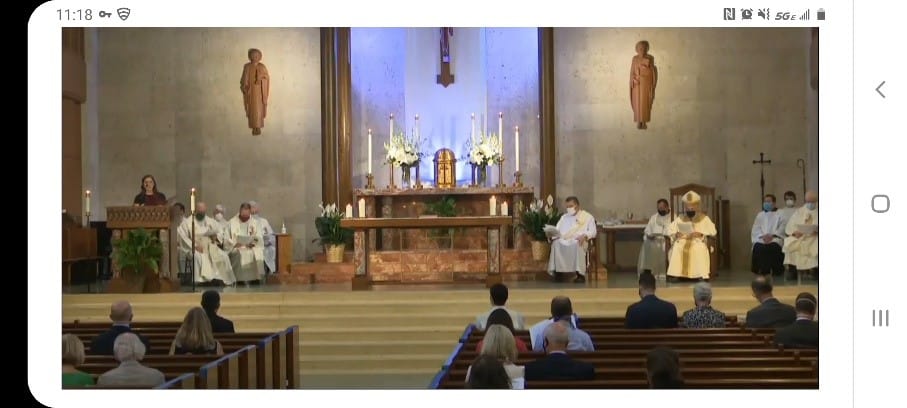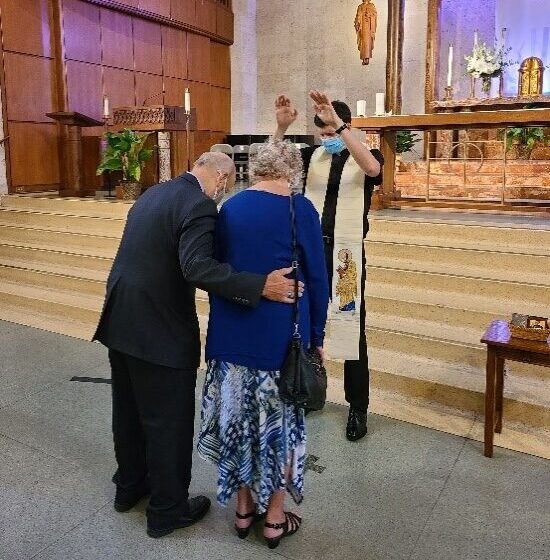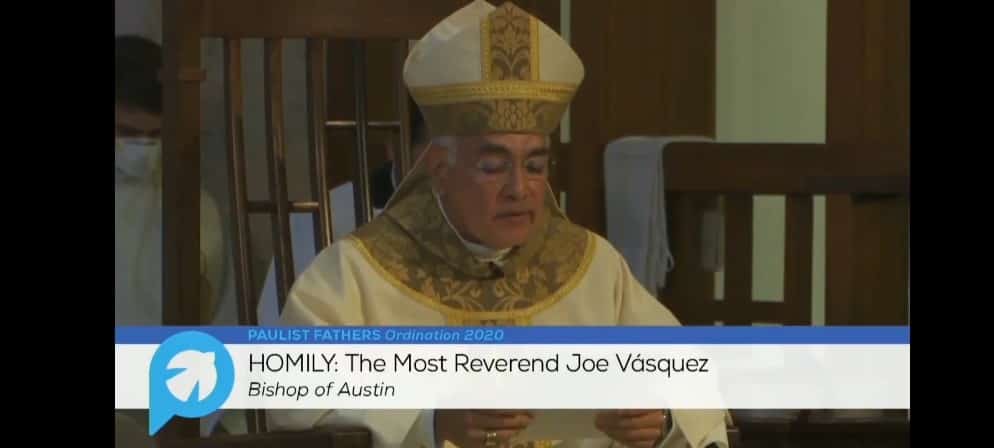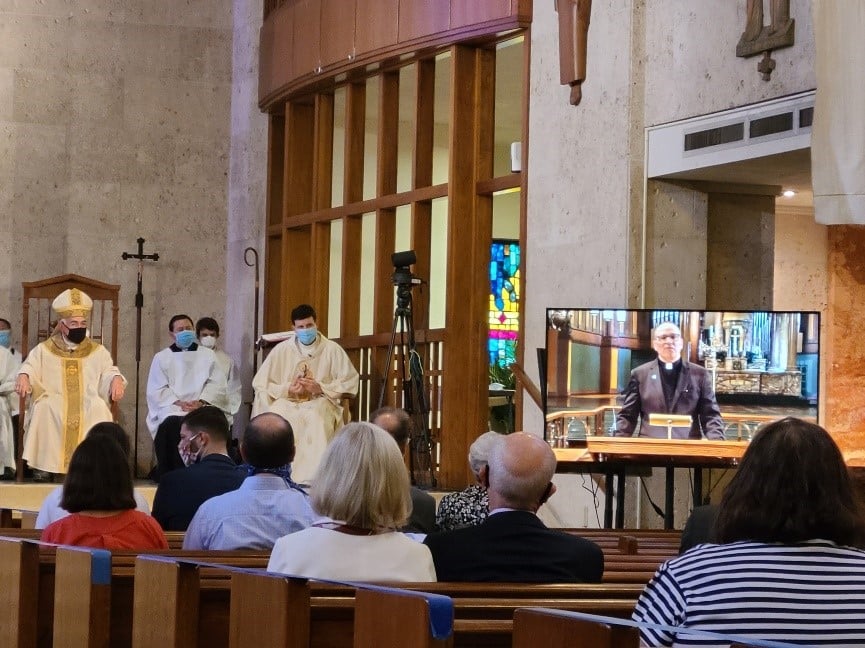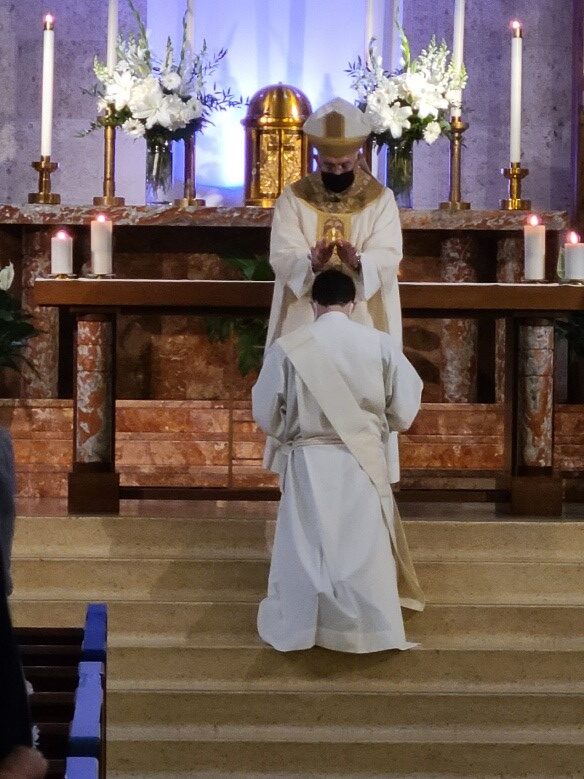August 3, 2020
Perfect for printing: Download this newsletter in PDF format
- New Diaspora Associatie makes first Promises on Zoom
- Paolo Puccini is Ordained a Paulist Priest during the Pandemic
- Using Cyberspace to Preach and Teach the Good News
- Wake up to the Racism in our Time
- Looking for Newsletter Input
- Our Monthly Programs for Our 15 Paulist Patrons
- Proposed Program for August: Elizabeth Ann Seton
- Renewing Promises and Updating Lists of Associates
- Paulist Associate News
- Prayer for the Intercession of Father Isaac T. Hecker
- Contacts
- Promise
by Richard Allegra, Diaspora Associate, formerly Boston Associate, resides in Palm Springs, CA.
People sometimes wonder if a Papal Blessing “takes” through the TV, radio or DVR (It does). Apparently the same holds true for taking one’s Promises over the Internet. On June 21st, the Associates in Diaspora welcomed Mary Susan Burnett, during its regular Zoom meeting, surrounded by family and friends, and witnessed by fellow Associates from across the country.
Richard: Mary Susan, Tell us about your unique connection to the Paulist Fathers.
I started attending mass at St. Mary’s of the Lake on Lake George before I can remember. My father’s family immigrated to Lake George from Scotland in 1853, so we have been neighbors for a long time. In addition to summers with the Paulists, I attended The University of Texas at Austin for graduate school, and during the first year, I attended Mass at the campus ministry center. Father Ken McGuire, who I got to know from summers at the Lake, baptized my youngest daughter (at the lake) and presided over a special First Communion mass for my older daughter at the National Shrine in Washington, DC. More recently, I had been meeting with Father Rich Colgan since July of 2019 for Spiritual Direction, but this was essentially at the same time I began exploring the Paulist Associates Program.
I met my husband, Jon, during freshman orientation week at college, and we have been married for 27 years. He was a Lutheran at the time, which was never an issue for me, as my father is Presbyterian. It did result in the agreement that our children would be raised in the Catholic Church, but they would have his last name. After 20 years of regularly attending mass, and a gentle nudge from a close friend, he went through RCIA and was received into the Catholic church. We have two daughters, the oldest just graduated (virtually) from the College of Architecture and Urban Studies at Virginia Tech, and the youngest will be heading back for her sophomore year at Virginia Tech this fall.
We are members of Nativity Catholic Church, in Burke, VA. I sing and play my guitar in the family and folk choir (or at least I used to before COVID-19).
I am a scientist by training and spent 15 years running a research lab focused on cardiovascular disease at the Washington Hospital Center, in Washington, DC. Through a combination of many factors, I took a leap of faith and God provided me with the perfect next step. I left my lab and became a teacher at one of the top STEM schools in the nation.
Richard: Mary Susan, what drew you to wanting to be a Paulist Associate and supporting the mission of the Paulist Fathers?
I can’t completely explain it. I was not even aware that there were Paulist Associates, until I was trying to find a new spiritual director. The Augustinian with whom I had been meeting was unable to continue for health reasons and he recommended I look elsewhere in Washington, DC, including with the Paulists. I started exploring websites, and when I got to the Paulist site, it was like I had come home. I began listening to the various lectures and learning about Paulist spirituality and history and everything seemed to fit. I greatly enjoyed the books I read and was very comfortable with the focus of evangelization (in a gentle way), ecumenism and social justice.
I run a charity organization a Laundry Love Team (https://laundrylove.org/) through my local parish (Nativity Catholic Church in Burke, VA). We visit a nearby laundromat one morning each month, bring breakfast and pay for everyone’s laundry. Most of my laundromat friends are immigrants, and I greatly value the relationships I have formed over the past five years, not only with Christians, but with Muslim families as well. God has certainly revealed himself to me through my work with people of all backgrounds and faiths. I have also actively prayed throughout my life that I would be open to the guidance of the Holy Spirit, and I appreciate the Paulist focus on this as well. My experiences with Paulists have always been moving and positive. I enjoy the intellectual nature of the homilies and the challenging messages that are regularly shared.
I have always felt like a bit of a low-key evangelist both as a scientist and as a teacher. Most of my post-doctoral fellows were international and would often ask honest questions not only about life in the United States, but also about Christianity. Now, as a teacher in a public STEM school, the vast majority of my students are Asian, and non-Christian. Of course, I am limited as to what I can say regarding religion in this setting, but I quietly wear a cross around my neck every single day and try to treat all of my students and colleagues as Jesus has taught us we should. As a school we also have our own unique racial equity issues that my fellow faculty members and I have acknowledged for years, but now may finally be able to do something about, since this has moved into the national spotlight (again).
I see potential for me to support the Paulist mission through evangelization, social justice, ecumenism and interfaith relationships, and essentially just using my gifts in whatever way the Holy Spirit prompts me.
Richard: Mary Susan, you are part of the Associates Diaspora Group. Tell us your impressions of faith-sharing in this unique setting.
I must admit, when I first was invited to participate in the monthly phone calls last November, it did take me a while to feel comfortable. It was hard not really knowing who I was speaking with and keeping track of names and voices with no faces. Once the pandemic struck, Father Mike Kallock suggested we try meeting over Zoom, and this actually made things much easier for me. Everyone has been very kind and welcoming, and I really appreciate that. I also have really enjoyed the series of programs we have been doing, examining the lives of the various Paulist Patron Saints. This format has stimulated some interesting discussions, and using Zoom makes it easier to take turns speaking and not all be talking over each other at once.
I do think our group is probably missing the “small talk” that naturally occurs when you are in a physical group, before and after the program. This is often where you get to know each other on a more personal level. We also don’t have the shared experience of the same physical environment (e.g. Parish), but we do have the shared experience of being scattered around the country with no Paulist Associate group nearby! I am grateful for the opportunity to meet with my Diaspora group, despite its unique limitations, and look forward to being able to meet with other Paulist Associates in person at some point in the future when it is safe to do so again.
I do think we were probably less impacted by the pandemic than most other groups, since we were already used to meeting by phone/zoom. This is our “normal.”.
By Kathleen Lossau, Austin Paulist Associate
Many of us have attended ordinations in the past. This one was wonderful and really well done under very extraordinary circumstances. On July 25th at St. Austin’s in Texas, Bishop Joe Vasquez ordained Paolo Puccini. I think this may have been the first ordination at St. Austin’s, and the first Paulist Ordination away from the motherhouse in NYC in over 25 years. I am sure it was the first one where so many people (including Paulists and friends/family of Paolo) had to attend via livestream. It certainly was the first one I attended where there was so much space and where everyone wore facemasks the entire time.
Fr Paolo is from Texas and has family throughout America, Colombia and in four European countries. He lived in Houston and later attended the University of Texas in Austin where he was introduced to the Paulists. Since we are in the middle of a pandemic there were very few people who were allowed to attend the Mass in person. Many Paulists including Fr. Eric Andrews had to attend the celebration virtually. In attendance were Paolo’s parents, siblings and some close friends and family, a few parishioners and Paulist associates.
Bishop Joe Vasquez understood the extraordinary circumstances and took every opportunity to include Fr. Paolo’s virtual family and friends in the celebration. Fr. Eric Andrews also made a virtual appearance that was shown on the large television screen to the congregation, the celebrants and over the livestream.
Concelebrating were the Paulists from Austin, some diocesan priests in Austin and a Jesuit from where Paolo attended high school.
The church was sparsely populated, and everyone wore masks and socially distanced. Most of the pews were blocked off with tape and each person in attendance had assigned seating to ensure we were compliant with all the local and CDC regulations. I was able to recognize a number of parishioners and Paulist associates from around central Texas. It does take a bit of time to recognize people when they are wearing masks.
We in central Texas are very excited to have Fr. Paolo here in Austin and are looking forward to all enthusiasm, insights and energy he brings to the ministry. While the line for first blessing’s was smaller than at other ordinations, the enthusiasm and excitement for our new Paulist Father was equal to all other ordinations. The photo above shows Fr. Paolo providing a blessing to Steve and Pat Macy (Paulist Associates here in Austin).
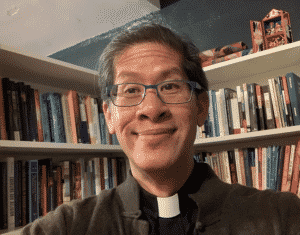
Seven years ago, I was invited to teach an online liturgy course at Santa Clara University in California. My immediate reaction was to say no, purely out of principle, since liturgy involves bodily senses, ritual actions, symbols, and other encounters best experienced in person, rather than in cyberspace.
Why would I want my manner of teaching to contradict all that I was trying to instill in my students?
Worship calls us to gather physically. We greet one another, smile, and shake hands. We hear choirs and instrumental music. We smell incense. We dip our fingers in holy water and mark ourselves with the sign of the cross. We listen and respond to the Word of God. We taste and see a glimpse of the heavenly banquet. Why would I ever want to share this multisensory, three-dimensional experience through a two-dimensional computer screen?
Despite my initial misgivings, I accepted the challenge and began to teach online. I have been so grateful I did as the COVID-19 pandemic social distancing requirements have unexpectedly imposed a new landscape for ministry, social outreach, and communication in religious life.
My “on-site” concerts, workshops, and missions are postponed until October, although it is uncertain whether health restrictions will allow us to gather at that time. However, in typical Paulist fashion, I began to brainstorm how I might “preach the good news,” despite these new limits. As a result, I now offer “online” video conference calls with Zoom, the same media tool I used to teach at Santa Clara University.
The format for each webinar is flexible and can be adapted to the age, experience, and number of those attending with varying aims, schedules, and topics. A list of my current workshops is available on my website.
I also developed two new topics to address these unprecedented times: “Hungering for the Body of Christ Amid Pandemic Distancing” and “At the Digital Banquet of the Lord: Livestreaming Masses with Sacramental Integrity.” These presentations – both of which are described in detail on my website — join technology with online prayer and ministry as the COVID-19 pandemic forces us to radically reconsider how we connect as the Body of Christ.
Moving from “on-site visitations” to “online ministry” has been an unexpected, but welcome challenge. I send out resources a week before our scheduled video conference call with reading materials, reflection questions, and exercises participants can do on their own beforehand. A week further on, we share a “follow-up” video conference where everyone can reflect together about what they have learned since our first conference call.
This way of ministry is not ideal, but I hope to continue online offerings, as appropriate, even after it is safe to resume in person presentations. Collectively, this unforeseen grace can give the Gospel – and the liturgy – a “new voice” in today’s world, where it might not otherwise be heard. age, experience, and number of those attending with varying aims, schedules, and topics. A list of my current workshops is available on my website at and includes two new themes (below) that hold particular relevance during our present pandemic challenges.
By Erin Cordle, Columbus Paulist Associate, and Associate Director, Office for Social Concerns, for the Catholic Diocese of Columbus
If we have no peace, it is because we have forgotten that we belong to each other. – St Teresa of Calcutta
I have been known to fall asleep in my comfy chair at night with the TV and lights on. Needless to say, that’s not the best way to get a good night’s rest. Sometimes, I fall asleep in an awkward position and awaken in the middle of the night with a numb arm or leg – especially if Tess (my dog) decides to curl up with me. When that happens, I am amazed at how long it takes me to decide to either get up and actually go to bed or just turn off the lights and TV and drift off again taking my chances that I’ll be able to stand in the morning. It also amazes me how often I decide to just tolerate the numbness.
Our Catholic Social Teaching calls for us to read the signs of the times. Any honest appraisal today would indicate that a significant portion of our citizens have fallen asleep in an awkward position and are choosing to take our chances when we finally decide to wake up. Nightly we are watching the heavy weight of years of dehumanization, of racism, and violent white supremacist positions on people of color that discounts and even nullifies their God-given dignity and worth.
We all are created in the image and likeness of God. Yet many of us have become numb to these realities or are choosing to remain mute to the obvious racism and discrimination that exists all around us. We are better than that!
For months, I have been trying to decide what my new normal will be. I’m sure I’m not alone in this quest. God love my dad. I still hear his wisdom while I’m struggling. Pappy was good at reminding me that life would provide me with a series of lessons. If I took on the lesson and bested it, I would grow. If I did not, the lesson would come back again – only harder. He also assured me that each lesson learned would help me with the next lesson coming down the pike. As farm boys go, he was quite the philosopher.
The question is, are we as a nation of people of faith, determined to wake up from our privileged slumber and shake up and transform our new normal to ensure justice and the pathway toward human flourishing for all? My prayer is that nothing goes back to normal – normal wasn’t working for us all. If we go back to the way things were, we will have lost the lesson.
We already have lost too much time by remaining silent. In 1989, the U.S. Bishops’ Committee on Black Catholics issued a statement commemorating the tenth anniversary of the national conference’s pastoral letter, Brothers and Sisters to Us: U.S. Bishops’ Pastoral Letter on Racism in Our Day. There was little to celebrate as the pastoral was soon forgotten and surveys showed that it had little or no impact of the majority of Catholics in the U.S.
Bishop James Griffin (Diocese of Columbus) wrote the pastoral “Racism: A Tarnished Reflection of Ourselves.” He addresses parents, religious leaders, government officials and community leaders, business leaders, teachers, and all people of good will. Bishop Griffin calls for “‘zero tolerance’ of racist comments or activity taking place even when you are not directly involved or affected.” The bishop asks government and community leaders not to allow “the ugly head of racism to arise in our community. Above all, do not allow members of your staff to ‘trade’ on this issue of racism for political gain.”
Addressing the personal roots of racism, Bishop Griffin proposed a series of questions that people can ask themselves as a “kind of ‘morality mirror’ in which to see” prejudices. One question asked, “How would I feel were I confronted by people who hold the same prejudices about me that I do about others?” The bishop said that “personal conversion and pastoral charity” are necessary to address racism, but he added that “conversion from prejudice must be linked to a sharing of power and influence with minority people.” He said, “We cannot let economic fears deter us from acting justly.”
I pray that more of us will allow the Holy Spirit to wake us up and shake us out of our numbness to the point where we are willing to speak up and work to assure that our communities of faith transform our country into who we say we are. I realize the conversion of hearts to accomplish this transformation must start with me. I’m ready and willing to wake up and speak up in my circles of influence. I’m willing to shout, if necessary, to not let my family and friends settle for allowing those of color, the poor, the vulnerable, and the marginalized to continue to be victimized. If I don’t do this for myself by any means necessary, who will?
We cannot go back to our old normal!
“In the end, we will remember not the words of our enemies, but the silence of our friends.” Martin Luther King, Jr.
The Newsletter is published monthly, except January and July. The January monthly Program appears in the December issue, the July Program in the June issue. Articles should be submitted at least a week before the end of the month to appear in the new month.
Material for Associates World is always welcome. We would love to hear what is going on with your local organization. If you have material for the newsletter please contact Denis Hurley <[email protected]>.
Submitted by Los Angeles Associates Lisa Wellik and Lou Ceppi. The Stain glass picture of Elizabeth Seton is from St. Paul the Apostle in Los Angeles.
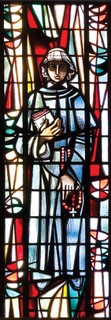
Ever-living God, your daughter Elizabeth Ann Seton
was blessed as a wife and mother,
educator and founder of the Daughters of Charity.
By her example and prayers
May we follow this American saint and learn to serve youIn the family and at school and work.
We pray this in the name of Jesus Christ
who lives and reigns with you and the Holy Spirit,
one God for ever and ever.
R. Amen.
(From Paulist Prayer Book, page 344)
Read in advance of meeting:
Elizabeth Seton occupies a unique place in the history of the Catholic Church in the United States. She established the first free Catholic school for girls in the nation and founded the first American congregation of religious sisters, the Sisters of Charity. In 1975 she became the first American-born saint to be canonized by the Vatican. Her Memorial is celebrated on the same day of the month that she died, January 4, 1821.
Born August 28, 1774, just one week before the First Continental Congress, Elizabeth Bayley grew up in New York City during the American Revolution. After the Patriot army fled New York, she lived through the long occupation of the city by the British soldiers, so she experienced sacrifice at an early age. Born a Protestant, her family were well-to-do aristocrats of New York society. From among many admirers Elizabeth chose to marry William Magee Seton, son of a wealthy shipping merchant. The Setons had five children, and Elizabeth socialized with elite New Yorkers of her time. In 1797, for instance, with the aid of several other women including Mrs. Alexander Hamilton, Elizabeth Seton organized New York’s first private charity, the Society for the Relief of Poor Widows with Small Children, at Trinity Church.
But the happy, prosperous times of her early marriage did not last. Because of the undeclared war with France in the early 1800s, and its adverse effect on shipping, the Setons went bankrupt. William lost his health and he, Elizabeth, and their eldest child set sail for Italy to aid in his recovery. Soon after arriving in Pisa, William died. His business partners, the Filicchi family of Leghorn, Italy, extended hospitality to Elizabeth and her daughter. Elizabeth was impressed with their devout Catholicism. When she and her daughter returned to New York a year later, and to the horror of Elizabeth’s family and friends, she decided to convert.
In March 1805, Elizabeth Seton was received into the Catholic Church at St Peter’s Roman Catholic Church, then the city’s only Catholic church. For three years she struggled to support herself and her five young children in her native city but without the help of friends or family. Then in 1808 she accepted an invitation from Reverend William Dubourg, President of St Mary’s Seminary, to open a school for girls in Baltimore. There she founded America’s first religious order, the Sisters of Charity. The sisters went on to establish educational institutions, hospitals, and social welfare agencies.
By the time of her death at 46, Mother Seton had raised five children, started the Catholic parochial school system in the United States, and founded the Sisters of Charity. Mother Seton received early recognition from the foremost ecclesiastics of the United States as foundress of the first distinctively American community of women, dedicated to active apostolate of education and charity. At a meeting of the American hierarchy in 1852, Baltimore Archbishop Francis Patrick Kenrick declared, “Elizabeth Seton did more for the church in America than all of us bishops together.” The
(Source: St. Peter’s Church/Our Lady of the Rosary – St. Seton Shrine https://spcolr.org/st-seton-shrine-1 )
Discussion Questions to Share in Your Group
(Developed upon reflection from Chapter 6 of “All Holy Men and Women: A Paulist Litany of Saints” Edited by Thomas A. Kane, CSP.)
In Colleen Griffith’s chapter on Seton, page 6 in All Holy Men and Women, she states about Seton: “In her writings and in accounts of her spiritual life, specific practices of Elizabeth stand out as suggestive for contemporary people of faith who juggle multiple responsibilities.” Here are the four practices of Seton presented by Griffith with related questions for discussion:
- “a commitment to practice enactment of love of God and neighbor in whatever circumstances one finds oneself;” Question: Where do you see the need today in your life for “loving effectively in ways that (are) concretely useful to others…?”
- “the adoption of a “can do” mentality, grounded in the realization that the work at hand is God’s work;” Question: Where do you see yourself engaged in a piece of “something much bigger than (yourself), namely the work of God?”
- “prioritization of what is truly important in any given situation and fidelity to it;” Question: What duty do you discern as a priority in your life at this time that merits “prayers to Him for grace to do it, and then (setting) our whole heart and soul to performing it (Richard Cardinal Cushing)?”
- “regular practice of prayerful praise of God, particularly when tired, lacking in cheer, or worn out.” Question: Describe any experience you recall giving praise to God while “handling complex life realities.”
News/Announcements/Prayers for Others:
Closing Prayer:
(All Holy Men and Women, page 9 – italicized words are Elizabeth’s own)
While I live, While I have my being, I will sing praises to my God;
For God has looked with love on my simple and confiding heart;
Generations to come will call me Mother of many daughters,
For the One who alone is mighty
Has changed my poverty and sorrow
Into the power to do great things. Holy is God’s name!
In every age our sweet Providence
has continually showered mercy over us.
God, my defense and shield and strength and Salvation,
Confuses the proud of heart,
Casts the mighty from their thrones,
And calls the lowly to look up with hope.
God raises me from the dust to feel that I am near the Light,
And drives away all terrors to fill me with peace.
God’s abundance fills the hungry,
While the rich are sent away empty-handed.
God, my Shepherd, sustains me in faith, hope, and charity
and leads me to assist the poor with tender compassion.
The God who remembers, who never slumbers or sleeps,
Upheld our mothers and fathers, our ancestors in faith.
So too for us and for our children, God keeps the promise,
Mercy for the future, as sure as the past.
Glory be to the Father, and to the Son,
And to the Holy Spirit, one God, forever and ever. Amen
We are always happy to hear about new Associates taking promises as well as current Paulists renewing theirs. Please post notices and photos on Facebook and let us know so we can add the information in this newsletter.
When these renewals take place, it would be helpful to all if the local coordinator would send an updated list of Associates to Kathleen Lossau so she can keep our contact list current. Please email contact information for those taking first promises and those renewing promises as well as a list of those who have opted not to renewing promises to Kathleen Lossau <[email protected]>.
I will be moving in mid-August from our Paulist residence and Mother Church, St. Paul the Apostle in mid-Manhattan, to become Novice Director for two years at our House of Mission and Studies in Washington, DC.
I am honored to take over for Rich Colgan who died of complications from Covid-19 on May 25th. It was Fr. Rich’s wish that I carry on his ministry if he was not able. I had previously served as Paulist Novice Director from 1988-1994.
I am also delighted to say that I will remain as Director of the Paulist Associates. I believe there is much similarity in the formation of Paulist Novices and Paulist Associates as they early on learn about and experience the Paulists, and our Mission, Charism, and Spirituality.
I think it will be exciting, rewarding, and challenging for me to serving as Novice Director and Director of the Paulist Associates at the same time.
|
Aug |
Elizabeth Seton – Los Angeles |
Dec |
Thomas Aquinas – Knoxville |
|
Sep |
Thomas Aquinas – Knoxville |
Jan |
The Blessed Immaculate Virgin Mary – ??? |
|
Oct |
John Henry Newman – Columbu |
Feb |
Alphonsus Liguori – Mike Kallock, CSP |
|
Nov |
John XXIII – West Michigan |
Mar |
Patrick – Rome |
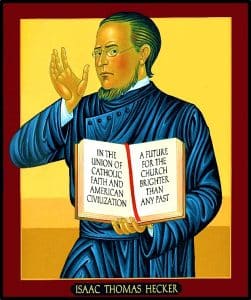
Look upon us this day, with compassion and hope. Hear our prayer. We ask that through the intercession of Father Hecker your servant, you might grant us (state the request).
We ask this in the name of Jesus Christ, Your Son, Our Lord, who lives and reigns with You and the Holy Spirit. One God, forever and ever. Amen.
When you pray this prayer, and if you believe that you have received any favors through Hecker’s intercession, please contact the Office of the Cause for Canonization of Servant of God, Isaac Hecker at [email protected]. Visit the web site: isaachecker.org to learn more about his life and the cause for his canonization.
Paulist Associates National Director
Mike Kallock, CSP
Paulist General Office
New York, NY 10023
Board Members
Carol Wagner Williams
Tuscon, AZ
Frank Desiderio, C.S.P.
Katherine Murphy Mertzlufft
Columbus, OH
Joe Scott, CSP
David Rooney
Chicago, IL
Mary Sullivan
Boston, MA
I believe that I am drawn by the Holy Spirit to the spirituality and qualities of the Paulist Community. I have discerned both by prayer and study that God calls me to become associated with the Paulists. I promise that I will pray for the works of the Paulist Society, meet with others, who are also members of the Paulist Associates, for spiritual sharing and formation; and I seek to embody the apostolic qualities of the Paulists in my daily life.
Attentive to the Holy Spirit and faithful to the example of St. Paul and the charism of Father Isaac Hecker, I commit myself for one year of membership in the Paulist Associates.
